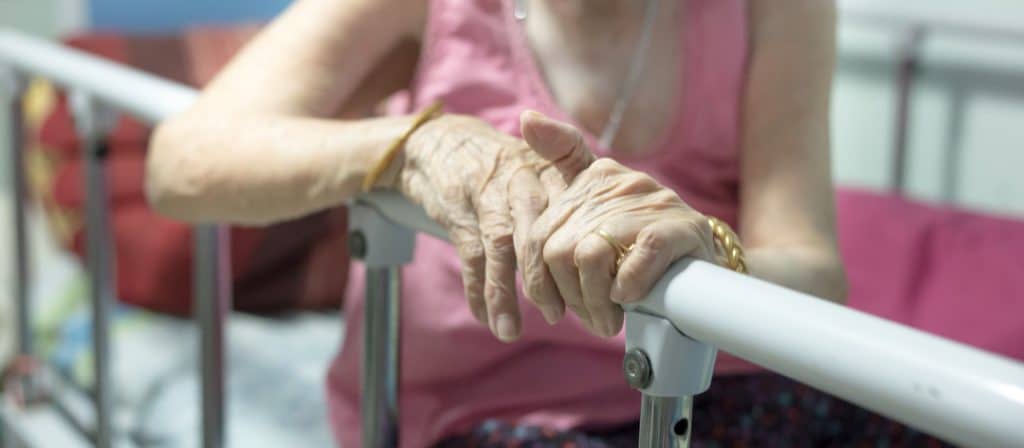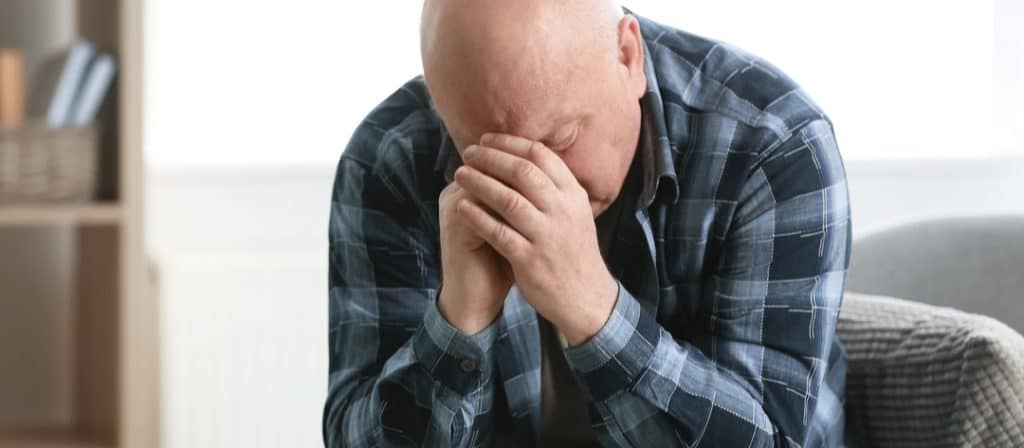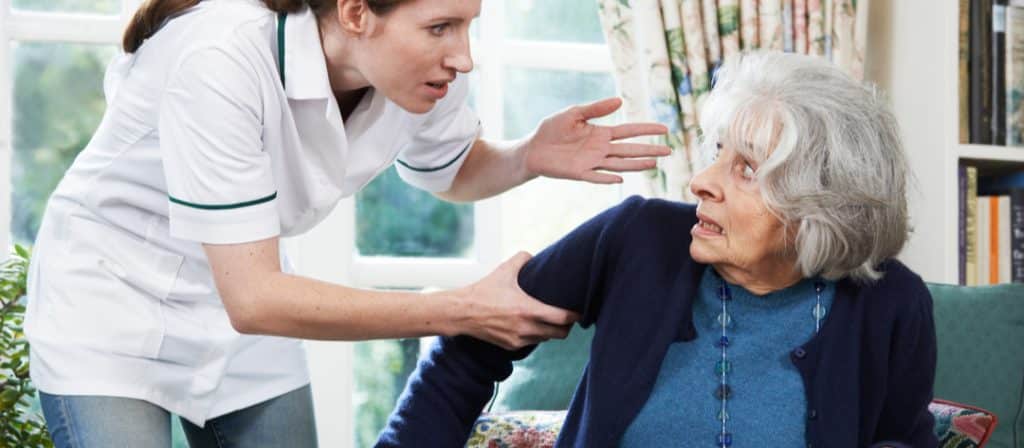Chicago nursing home abuse lawyer | Why you need an Advocate!
Last updated Wednesday, August 24th, 2022
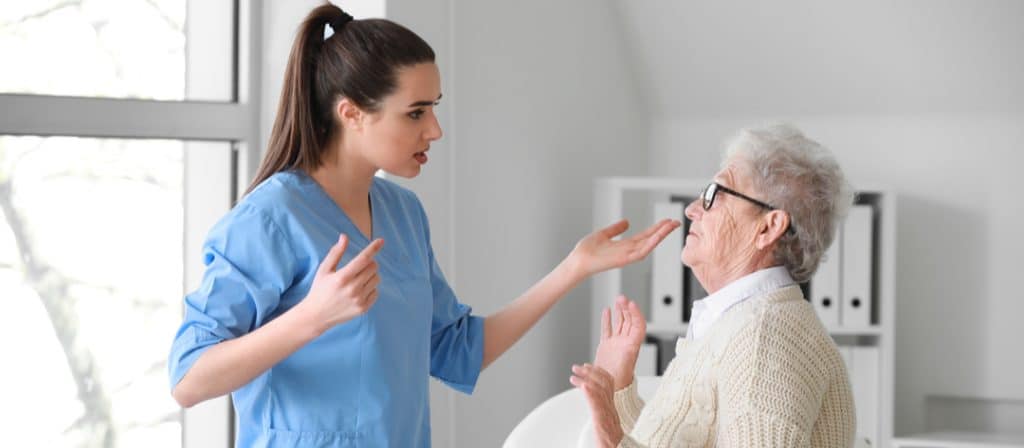
Nursing Home Abuse Issues
Chicago nursing home abuse lawyers exist for a reason, one that none of us ever want to run into. We know that you love your elders and that you seek and vet the best possible options for their care when living at home is no longer an option that is safe for them. Even after you have vetted the facility you’re placing your loved one into, you may still have to be vigilant. Elderly people are among the most vulnerable people in our society.
The following are the most common nursing home abuse cases that a Chicago nursing home abuse lawyer might be called for.
Neglect
In many nursing home abuse cases, residents aren’t subject to outright abuse. Instead, they’re neglected and don’t receive adequate care, which is itself a form of abuse. This could be due to a lack of sufficient staff, insufficient training, or staff that simply don’t care.
When nursing home residents are neglected, they don’t receive adequate food and water. Additionally, they aren’t able to bathe as frequently. Plus, they may not get the physical therapy that they need and they may not be given their medications.
Nursing home residents that suffer neglect often have physical signs of that neglect such as weight loss, worsening of medical symptoms, as well as signs of poor hygiene due to a lack of regular bathing.
Why Patient Neglect Is A Common Problem In Nursing Homes
Are you having a hard time understanding why patient neglect is such a common problem in nursing homes? For the average person, the idea of neglecting or abusing an elderly person is unfathomable.
The fact that this neglect or abuse is happening in a facility that is designed to care for elderly people makes the situation even worse. In many cases, elderly person isn’t abused, but they still suffer because their caregivers neglect to attend to their needs properly. So, why is patient neglect becoming such a major issue today?
Lack Of Supervision
Many cases of nursing home neglect are due to a lack of supervision. In an ideal world, everyone would do their jobs to the best of their abilities at all times. But, this isn’t an ideal world. That’s why we have supervisor positions in the workforce. They are there to ensure that workers do their jobs.
In some nursing homes, a lack of supervision leads to employees neglecting their duties or making mistakes. Neglect of elderly people doesn’t have to be due to malicious intent. It can also be due to honest mistakes that fall under the radar.
Caregivers Can Become Frustrated
We all have parts of our jobs that we’d rather not deal with and that’s true for caregivers in nursing homes as well. Imagine working in a nursing home and being responsible for giving medication to patients that fight you about it every day.
These patients need their medication, but getting them to take it can be a long, drawn-out battle. Maybe one day a caregiver decides that he doesn’t feel like going through that battle today. That’s just one example of how nursing home neglect can result from frustrated caregivers.
Lack Of Training Staff
In some cases, nursing home neglect happens because facilities are understaffed. If a facility doesn’t have enough personnel it can be difficult for them to fulfill its duties adequately. Things fall through the cracks and then residents end up suffering.
Fatigue is another problem to be on the lookout for in nursing home neglect. If caregivers are working a lot of hours and are understaffed, they’ll become mentally and physically tired which can then lead to mistakes.
Physical Abuse
Caring for elderly people requires patience and compassion and even the best caregivers can become frustrated. Unfortunately, these frustrations sometimes boil over causing a caregiver to push, strike, or otherwise abuse a vulnerable elderly person who is in their care.
In some cases, a caregiver won’t outright hurt the person they’re caring for, but they will be rougher with them while helping them. Unfortunately, this can cause pain and injuries as well.
The idea that someone might be physically abusing your loved one is probably enough to turn your stomach. Fortunately, physical abuse is one of the easiest forms of abuse to spot.
Therefore, if you start noticing cuts or bruises during your visits, start asking questions. Falls and accidents happen, but when you start to see a pattern of these so-called accidents, that’s when you should be concerned.
Emotional Abuse
Sadly, emotional abuse is all too common in some nursing homes. Emotional abuse isn’t something that can be seen in many cases, so you’ll have to pay attention to changes in your loved one’s behavior.
If you notice them being fearful or withdrawn when this isn’t their normal way of behaving, there’s probably something causing this change. In emotional abuse cases, caregivers will call residents names, mock them, threaten them, and do other things to make them feel sad and belittled.
Emotional abuse may not leave the same scars that physical abuse does, but it does hurt and can cause lasting damage as well.
Examples Of Psychological Abuse In A Nursing Home
There are many examples of psychological abuse that could happen in a nursing home and all of them can inflict lasting mental anguish on residents. Elderly people are uniquely vulnerable to abuse when they are in a nursing home.
While most nursing homes employ caretakers that take care of residents to the best of their abilities, there are times when abusive ones manage to secure positions. When this happens they may turn abusive out of frustration, or they could just be the type of person who enjoys wielding power over others.
No matter what their reasons are, psychological abuse against a vulnerable elderly person should never happen.
Abuse Doesn’t Have To Be Physical To Cause Harm
Just because a caregiver doesn’t physically touch their victim doesn’t mean that their victim doesn’t suffer harm from their abuse. Psychological abuse can cause elderly people to feel stress and lead to them becoming withdrawn and depressed.
If you notice your loved one behaving differently, don’t just assume that it’s related to normal age-related decline. Their change in behavior could be the result of psychological abuse.
What Are Some Of The Examples Of Psychological Abuse That Occur In Nursing Homes?
1. Calling names or belittling. This form of abuse involves mocking the beliefs, appearance, physical limitations, or anything else about a person that causes them to feel embarrassment or shame. Abusers who call names and belittle people may be malicious, or it could be simple immaturity on their part.
Maybe the person calling names thinks it’s funny or they don’t think that the resident is aware that they’re being made fun of. This type of abuse can also be triggered by frustration or it could be the result of a mean-spirited caregiver who enjoys making other people suffer.
2. Threatening. When a caregiver threatens a nursing home resident they’re implying or stating that they will hurt them. This is often done to get a resident to comply with something that they don’t want to do.
Threats can involve the threat of physical harm. They can also involve the threat of a reduction in privileges or withholding food or medicine. Additionally, a staff member could use a threat to not allow the resident to see their family any longer.
3. Ignoring a resident is a passive-aggressive way to frustrate them and cause them distress. With this type of abuse, caregivers simply ignore residents when they speak to them and refuse to acknowledge them. This, in turn, can lead to fear and frustration.
Sexual Abuse
Whenever you have a group of vulnerable people in one area, you’ll have to consider the risk that a sexual predator will try to satisfy their sick urges by preying upon them. Sexual abuse happens, and if you aren’t looking out for the signs that it may be happening, then you could be allowing your loved one to suffer.
If your loved one shows signs of abuse or becomes withdrawn or irritable, this doesn’t automatically point to sexual abuse, but it can point to some kind of abuse. The biggest red flag would be if your loved one is diagnosed with a sexually transmitted disease.
Financial Abuse
In addition to physical, mental, or sexual abuse, you also have to be on the lookout for financial abuse. Many elderly people aren’t quite as sharp as they once were, making them prime targets for those willing to take advantage of them.
Sometimes financial abuse is something as simple as caregivers refusing to allow residents access to funds needed to make purchases. Far too often, financial abuse involves an abusive caregiver using their position to gain access to the finances of the person they’re caring for.
From draining bank accounts to opening lines of credit in their names, abusers will go to any lengths to find a way to steal from vulnerable elderly people. To help prevent your loved one from suffering financial abuse, make sure that you keep a close eye on their finances and look for signs that something isn’t right.
Common Nursing Home Abuse Cases Mean That The Relatives Of Residents Must Remain Vigilant
Nursing home abuse cases are sad and tragic, and in many cases, they can go undetected for a long time. Elderly people are easy targets for people who lack morals. While most nursing homes do a great job at screening potential employees, there will always be some that somehow manage to slip through the cracks.
Or, there will be great candidates who, for whatever reason, become abusers. When you place a loved one in a nursing home you should be able to trust that they will get the kind of care that you can’t provide yourself. That’s what nursing homes are for. To help elderly people who need more care and attention than most people can provide on their own.
So, how do you protect your loved one from abuse? First, make sure you visit regularly. Your loved one will be thrilled to see you and on top of that, being present at the facility regularly will show any potential abusers that you’re the type of family member who is more likely to notice if there is a problem.
Next, ask questions. If something doesn’t seem right then ask what is happening. If you notice injuries or changes in behavior, don’t just accept that the nursing home is telling you the truth. Question them and if you don’t get the answers that you need you should move your loved one into a better facility.
Is Nursing Home Elder Abuse On The Rise?
When you place a loved one into a nursing home you do so with the understanding that they will be safe, respected, and well cared for. For most people the idea of abusing elders is appalling, but it does happen. Elderly people are much more vulnerable than typical members of society, which makes them the kind of victims that abusers look for.
Elderly people are less likely to tell people about what is happening. Plus, if the elderly person is suffering from dementia, they may be completely unable to speak up. Because of their vulnerability, it’s essential that everyone with a loved one in a nursing home is aware of the signs of abuse.
How Are Elderly People Abused?
There are many ways that elderly people can be abused in nursing homes. Sometimes the abuse is intentional, other times the abuse is a result of neglect or when a caregiver becomes frustrated and lashes out. No matter what the cause is, abuse of anyone, especially elderly people that are more vulnerable, cannot be tolerated.
Some elderly people are neglected and are not given adequate access to food, water, exercise, medical care, therapy, and medications. Some elderly people are mentally abused by caregivers who call them names, mock them, or do other things that make them feel belittled.
Elderly people are also often the victims of physical abuse from caregivers that are rough with them. Or, in some cases, caregivers who outright strike and push them. Elderly people are also frequently the victims of financial abuse when their caregivers take advantage of their diminished mental capacity. Sadly, some elderly people are also victims of sexual abuse.
How Many Elderly People Are The Subject Of Abuse?
Believe it or not, current estimates are that 1 in 6 elderly people are the subject of abuse in nursing homes. That’s a high number. And, if you have a loved one in a nursing home, it’s a number that should concern you. With the population of elderly people increasing each year the chances for abuse are going up as well.
How Can You Help Prevent Nursing Home Elder Abuse?
Do you have a loved one in a nursing home? And, do you want to do whatever you can to help ensure that they are not being abused? First, start by making sure that the facility that they are in is a reputable one. If it’s not, then you need to move them to one that is.
Next, be present in their life. Your elderly relative would probably love you to visit frequently, so you should. Frequent visits show potential abusers that you care about your relative. This increases the chances that abuse would be noticed. Abusers don’t want to be caught. Therefore, if they know you are a frequent visitor they may decide that targeting your loved one is not worth the risk.
The most important thing you can do to help prevent elder abuse is to pay attention to what’s going on. If you see physical or mental signs of abuse then investigate it. Keep on top of their finances as well and if you notice a problem, say something. By being vigilant you can help to protect your loved ones and prevent them from becoming the victim of elder abuse.
Six Nursing Home Abuse Stats Every Family Needs To Know
Families need to trust that nursing homes will provide compassion and professional care for their loved ones, but sometimes this trust is betrayed by unscrupulous companies and individuals. In fact, the real nursing home abuse stats can be quite alarming.
This abuse can take many forms, whether it’s neglect, cutting corners on services, taking advantage of seniors financially, or instances of physical abuse. For families whose loved ones have suffered this abuse, nursing home abuse attorneys can help them seek justice for their loved ones.
Nursing Home Abuse Stats
1. Elder abuse is a problem more widespread than most of us know. Consider these facts from the National Council on Aging and the National Center on Elder Abuse:
2. Nearly one in 10 Americans over the age of 60 have experienced elder abuse. Some experts estimate that as many as 5 million seniors experience abuse each year.
3. Only about one in 14 elder abuse cases are ever reported to the authorities.
4. One in three nursing homes in the U.S. has been cited for violations.
5. Seniors with dementia are more likely to be abused than other seniors. About half of seniors with dementia experience abuse or neglect.
6. Seniors who have been exposed to elder abuse have a 300 percent higher risk of death than seniors who have not been mistreated by their caregivers.
Caring for elders is a sacred trust and when this vulnerable population is taken advantage of, loved ones are left to deal with the emotional, medical, and financial consequences. A Chicago Nursing home abuse attorney will help families obtain the compensation they deserve when their family members are mistreated.
Take Note Of These 5 Signs Of Possible Abuse
These are a few signs that there may be an issue with your loved one’s care:
1. Unexplained marks or bruises that appear frequently.
2. Changes in your loved one’s eating habits or personality.
3. Over-medication of elders.
4. Declines in personal appearance and cleanliness.
5. Unnecessary medical tests and treatments. Facilities may sometimes schedule unneeded and questionable medical tests and treatments to bill their residents’ insurers or the government.
Should you notice these signs in your loved one, you should investigate further and contact an experienced nursing home lawyer if needed.
Contact a Chicago Nursing Home Abuse Lawyer if You Suspect Any Type of Abuse
The worst thing you can do if you suspect any type of elder abuse is not to listen to your gut and doubt yourself. If you feel there might be abuse happening, you owe it to your loved one and every other resident to do something about it.
You should bring the abuse concerns you have to the management at the facility. You can also seek guidance and support from our team, nursing home abuse law firms like Shuman Legal® are here to help you ensure that the abuse stops and that the abusers are brought to justice.
Sources: https://ncea.acl.gov/NCEA/media/Publication/ResearchBriefLTCF.pdf

